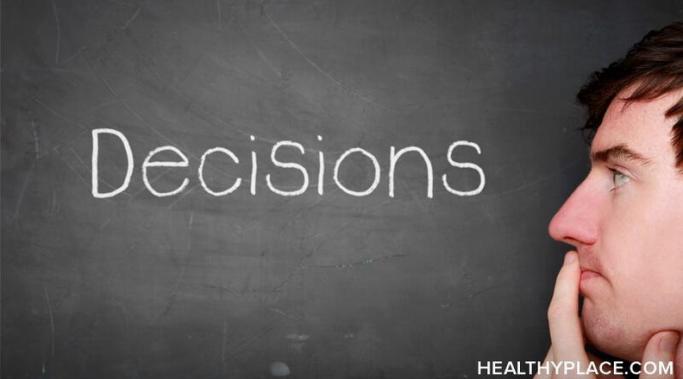In bipolar disorder comorbid conditions (conditions that occur alongside the bipolar disorder) are more the rule than the exception. In the video I discuss the psychiatric and non-psychiatric conditions that commonly occur alongside bipolar disorder.
Medication Side-Effects
In psychiatric studies, generally response and remission are recorded for the effectiveness of medications. So, a certain percentage of people positively respond to medications (get somewhat better) and a smaller percentage of people go into remission (get mostly better) from medications. The definitions of “respond” and “remit” vary, but typically it’s a reduction in symptoms, as measured on a scale, to a specified degree.
In practice, this means that a medication can still be deemed “effective” even if it only moves you from a 10 to a 5 on a scale of depression.
Well, this isn’t good enough.
Today I tuned into a webcast on managing bipolar depression. I wasn’t sure what to expect although I was aware the webcast was designed for doctors so I knew the level of discourse would be high.
And I must say it was a great hour. Granted, I knew the vast majority of what was being presented but the nuggets of new items here and there definitely made it worthwhile.
What’s more is that this view on managing bipolar depression is evidence-based and they present the numbers behind what’s recommended. They make clear which studies are drug company-funded and which are not. It’s the kind of information that I wish every doctor knew.
And, if you have bipolar, especially bipolar depression, it’s the kind of information you should know too.
Recently I went through a nasty bipolar medication change. I stopped one antipsychotic in favour of another. Of course, this was to improve my overall treatment. And as I’ve said before, if you change nothing then nothing changes, and in this case, I had to change medications in the hopes of changing my mental wellness.
It did not go well.
What ended up happening was a gradual slide into horrific suicidality. The new med was not effective for me.
But I learned something from this experience. Before changing bipolar medications, it’s a good idea to put into place a medication change safety plan.
Recently, our blogger Natalie Jeanne Champagne wrote a post: Mental Illness: Understanding Rational and Irrational Fears and this got me thinking about the fears I, and others, have had about bipolar medication. Some of the bipolar medication fears are completely justified and rational while some really are not. Some are fears that stem from real possibilities while others are often propagated by fear-mongering groups online or our own internal catastrophizing.
I get asked about the sex life of the bipolar on a regular basis. People want to know what’s “normal” or can they have that mythical “normal” sex life. Some of these people are partners of people with bipolar and others are the people with bipolar themselves. It seems we’re all a bit mystified as to how this mental illness affects our sex lives.
Well, I can’t say what is normal for you, but I can tell you what I know about bipolar and sex.
I have been on every bipolar medication you can name and likely a few you could not. I have been on more medication combinations than I can remember. I have spent years dealing with medication side effects. There is very little medication pain that I cannot tolerate. I have taken medications that have made me feel amazingly well and bipolar medications that have made me feel intolerably ill. I’ve seen treatment miracles and treatment devastations. And still, I feel nothing but terror when I think of taking new bipolar medication.
Some time ago, I wrote about generic medications. I explained that generic medications are bioequivalent to brand name medications within a given margin. Generic medications may use binding and other inactive agents that are different from the brand name medication. All of this can lead to a generic being less effective than the brand name drug in a small percentage of cases. Usually though, the generic works just fine for people and the switch is unnoticeable.
And all that information was correct.
But new information has arisen. And it’s alarming information to me. It’s information on exactly how bioequivalence is determined for medication and in the case of one generic medication, the generic of Wellbutrin XL 300 mg, it caused an ineffective drug to be allowed on the market for many years.
If there’s one thing to remember about psychiatric (psych) meds it’s that you need to take them and you need to take them on time. This is because medication puts chemicals into your bloodstream and in order to keep a consistent level of these chemicals in your bloodstream, you must take the drug as prescribed. This is particularly critical in bipolar disorder as it’s easy to become unstable with an uneven level of psych med in your blood.
But we’re all human. We all mess up and forget things and we all miss a dose from time to time. So how do you handle missing a dose of a psych med?
I use the word “doctor” quite liberally and often use it interchangeably with “psychiatrist.” The reason is quite simple – psychiatrists are, in fact doctors, they are just specialists. Yes, that’s right, your psychiatrist has all the rights and privileges that any other doctor has and could probably remove your spleen, if the occasion called for it.
Nevertheless, there are some crucial differences between “doctors” in general and “psychiatrists” in particular. And sometimes you need a psychiatrist and sometime any old doctor will do. So how do you know if you need a psychiatrist?






![MP900337355[1]](/sites/default/files/styles/blog_listing/public/uploads/2013/01/MP9003373551.jpg?itok=-JTBPXwz)
![MP900337234[1]](/sites/default/files/styles/blog_listing/public/uploads/2012/12/MP9003372341.jpg?itok=sRXYi79a)
![MP900337265[1]](/sites/default/files/styles/blog_listing/public/uploads/2012/08/MP9003372651.jpg?itok=Q8RFhXjw)
